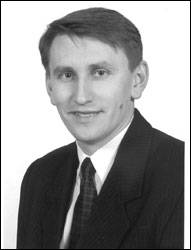"…Prayer for a fair, transparent, democratic and peaceful election in Ukraine united almost all churches and religious organizations."

 — The Institute of Religious Freedom has now existed for more than one year. How did you come up with the idea of creating such an institute? What were the initial emphases and what was added in the course of work?
— The Institute of Religious Freedom has now existed for more than one year. How did you come up with the idea of creating such an institute? What were the initial emphases and what was added in the course of work?
— In the first place, the Institute of Religious Freedom is an ordinary public initiative. The idea to create such a civic organization arose in the late 1990s. I was deeply concerned about the issues of freedom of conscience and religion, and, together with others, I saw that, on the one hand, religious freedom is a gift from God in our country, but, on the other hand, it should be nurtured all the time.
The initial emphases of our institute were to develop the legal background of freedom of conscience and religion, to further state and confessional relations, to monitor the church and religious life, and to analyze religious processes. Later on, other emphases were added; the most important one was to improve interchurch and interconfessional relations.
— Legislation is part of your work. Could you please give us a general and, if possible, an accurate assessment of the religious legislation of Ukraine? What can you suggest to improve it?
— It won’t be anything new if I say that the Ukrainian law “On Freedom of Conscience and Religious Organizations” is one of the most democratic in the world. At the same time, we need to improve it, taking into consideration the realities of social life. What we need here is a careful, transparent and democratic approach.
We can improve the law “On Freedom of Conscience and Religious Organizations” only by providing absolute freedom of conscience and of the work of religious organizations in accordance with international norms in the sphere of religious freedom and by creating favorable conditions for equitable dialogue and cooperation between the state and the church.
— The Council of Representatives of Christian Churches of Ukraine (CRCCU), founded a year ago and consisting of several members, is much more active than the pro-government All-Ukraine Council of Churches and Religious Organizations (AUCCRU). What led to the creation of the new organ and what is the basic difference between the two? Did the authorities show any resistance to the work of the CRCCU?
— The CRCCU was set up on 2 December 2003, when the leaders of the six following Christian confessions- Ukrainian Orthodox Church-Kyivan Patriarchate [UOC-KP], Ukrainian Greek Catholic Church [UGCC], Roman Catholic Church [RCC] in Ukraine, All-Ukraine Union of Churches of the Evangelical Faith-Pentecostals [AUU CEFP], Ukrainian Christian Evangelical Church [UCEC], and the Brotherhood of Independent Churches and Missions of Evangelical Christian Baptists of Ukraine- signed a corresponding declaration. As far as the establishment of this consultative and advisory interdenominational organ is concerned, I think it would be a good idea if you asked the church leaders who founded the council.
I believe the creation of the CRCCU seems a perfectly legitimate result of the objective development of interchurch relations in terms of the dialogue among Christians to revive Christian morals in Ukrainian society and to overcome the consequences of Soviet atheism and totalitarianism in the religious sphere.
The CRCCU and the AUCCRU do differ, starting from the format of participants and finishing with the degree of influence of the state factor on decision-making. Nevertheless, it cannot be an obstacle to effective cooperation between them, when we consider that five out of six participants of the council [CRCCU] are members of the AUCCRU. So, attempts to present the CRCCU as an alternative to the AUCCRU seem to have no grounds.
I have had no information about attempts of the government to oppose CRCCU activities so far. Moreover, an attempt was made to initiate cooperation among the CRCCU, the AUCCRU and the government to protect human life; unfortunately, this project will be carried out only after the elections.
— The discussion of religious and political relations in Ukraine became even more popular before the elections. Do you think churches and religious organizations had an influence on the pre-election processes in Ukraine? Can you give examples when the government or some political forces exerted pressure on churches before the elections?
— The influence of the religious factor on social and political processes in Ukraine, as with anywhere else in the world, is annually increasing. According to different public-opinion polls, the church, as a social body, has earned the highest level of trust among Ukrainians for many years (nearly 57%-65%). Together with the increasing number of religious organizations, this was one of the major reasons why some political forces were making use of the religious factor to achieve their goals.
It has become a well-established tradition that, at the start of some important social and political events, Ukraine’s National Committee on Religious Matters (not of their free will, I think) initiates the adoption of AUCCRU addresses, which later, due to biased mass media coverage, are directed against the opposition and, vice versa, support the acting government. For instance, in September 2002, at the start of the political action Arise, Ukraine!, which was jointly conducted by the Socialists, the Yulia Tymoshenko Bloc, and the Communists, at the initiative of Ukraine’s National Committee on Religious Matters, “The Address to the Ukrainian People, Representatives of Political Parties and Social Organizations of Ukraine” appeared. (By the way, this address was not supported by all the AUCCRU members, therefore we cannot consider it to be an official document of the AUCCRU).
In October 2004, Ukraine’s National Committee on Religious Matters suggested the AUCCRU members sign “The Address of the AUCCRU to the Ukrainian Nation on the Day before the Presidential Election in Ukraine,” which said that the heads of various confessions “are concerned about the unjustified agitation around the presidential election in Ukraine, as well as the attempt to cause strife and TO BRING PEOPLE OUT ONTO THE STREETS IN ORDER TO ACHIEVE THEIR UNJUST GOALS [emphasis added- RISU editor]. The fact that the last phrase was introduced into the text of the address after the well-known events which took place on the night from 23 October to 24 October 2004 at the Central Election Commission building makes it all clear in favor of what candidate, and against whom, this address was meant to be used.
During approximately the same time, in October 2004, in certain regions of Ukraine the local departments on religion initiated the signing of addresses to the clergy and the faithful concerning the presidential election in Ukraine by regional religious leaders, where they provided direct or indirect support to one of the candidates. For instance, the text of the “Address of the Heads of Religious Centers and Eparchial Boards of Transcarpathia to the Clergy and the Faithful concerning the Future Presidential Election in Ukraine” said that “falling unemployment, a substantial increase of social subsidies and care for the retired are direct results of the activities undertaken by the current government, headed by Viktor Yanukovych.”
These and many other factors which take place in the relations between the state and the denominations lead to a crisis of trust in the relations between the state and churches and religious organizations.
— Is it possible to note some political preferences of certain churches and their pastors on the basis of the texts of the addresses? Can we talk about the division into pro-government and opposition blocs? Could you please separately characterize the address concerning the election signed by the majority of the AUCCRU members and compare it to the address of the CRCCU?
— Churches and religious organizations have always tried to be politically correct and not to show any support of this or that candidate. This position is fully understandable and normal. But, on the other hand, it does not necessarily mean that church addresses and messages of their leaders do not involve certain social and political points.
I prefer not to talk about the division of religious organizations (churches and denominations) into pro-government and opposition church blocs. The fact that the leader of some denomination favors this or that candidate does not mean that all clerics and all faithful of this religious community support the same candidate. But, on the other hand, I would like to say that prayer for a fair, transparent, democratic and peaceful election in Ukraine united almost all churches and religious organizations.
You asked me to compare the “Address of the Heads of the Christian Churches of Ukraine to the Ukrainian Nation concerning the Presidential Election in Ukraine” from 30 September 2004 (publicized by the UNIAN Information Agency on 7 October 2004) and the “Address of the [AUCCRU] to the People of Ukraine on the Eve of the Presidential Election,” dated 26 October 2004, so I would like to draw your attention to the following things. The first address is a voluntary initiative of the heads of eight Christian churches of Ukraine, who felt it their duty to draw the attention of their compatriots to the spiritual and moral aspects of the electoral process. The second address happens to be the initiative of the National Committee on Religion Matters of Ukraine. (It is hard to say how voluntary it was, since it is part of the central executive branch of power) and, in my opinion, it was done at somebody’s order “from above.” I think this is the reason why some churches which are part of the AUCCRU did not sign this address: they did not want to be involved in the political standoff.
— How do churches and religious organizations assess the first round of the presidential election, held on 31 October? What will religious denominations do in case the political situation in Ukraine became more aggravated?
— I think that, in general, churches and religious organizations are satisfied with the results of the first round of the presidential election, despite all these difficult circumstances in which the electoral process took place. They were praying and the grace of God came on Ukraine: people were actively coming to the polling stations, civil peace was preserved, and people felt their responsibility for the right choice and for the destiny of their country.
On the other hand, in society there are certain things the churches feel concerned about. It is not accidental that before the presidential runoff, heads of the leading churches had to address their compatriots, in which they displayed the Christian position concerning the presidential run-off vote. (Common Address of the UOC-KP, UGCC, RCC, AUU CEFP and the UCEC dated 12 November 2004 and the address of the UOC [Ukrainian Orthodox Church-Moscow Patriarchate] from 14 November 2004)
Regarding your question about possible actions of denominations if the political situation would be aggravated, I think that, in the first place, churches and religious organizations will continue their prayer for Ukraine and the Ukrainian nation; because, according to Christian beliefs, the solution to difficult political situations lies in the spiritual sphere. We were witness to the grace of God in the first round of the presidential election, held on 31 October 2004, and we have every reason to hope for it in the runoff.
Lviv-Kyiv, 17 November 2004









